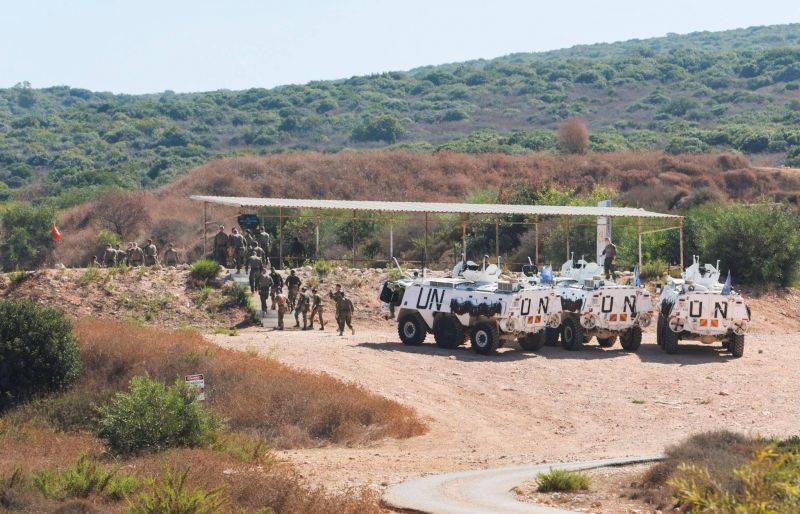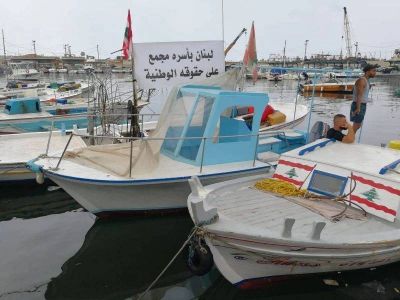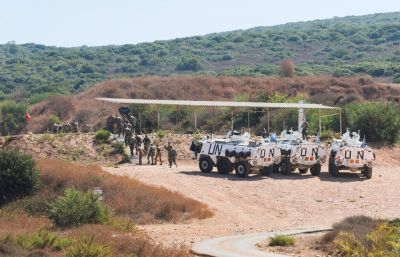
UNIFIL soldiers this week in the Lebanese town of Naqoura. (Credit: Aziz Taher/Reuters)
The atmosphere changed dramatically in just a few hours. Lebanon woke up on Thursday with the conviction that the agreement on the maritime border delimitation with Israel was almost a done deal.
Caretaker Prime Minister Najib Mikati even publicly congratulated himself in the morning that this diplomatic success would “spare the region a new war.”
In the evening, however, the risk of war seemed real again, with Israeli Defense Minister Benny Gantz calling on the army to prepare for a possible “escalation” on the northern border with Lebanon.
And in a tweet Thursday afternoon, Gantz wrote that Israel’s “greatest immediate operational challenge” lay along that same stretch of border. What happened in the meantime?
Israeli Prime Minister Yair Lapid on Thursday ordered the country’s negotiating team to reject the Lebanese amendments to the maritime border proposal of American mediator Amos Hochstein.
These amendments were presented on Tuesday as “details” by Lebanese Parliament Deputy Speaker, Elias Bou Saab, mandated by President Michel Aoun to follow the negotiations.
Did Bou Saab want to minimize their importance so as not to appear to be overreacting, or is it the Israeli side that is exaggerating their seriousness for internal reasons?
What happened actually a bit of both.
It was the details indeed, as both parties agreed on the essence of the deal. But these particulars appear to be of paramount importance, especially in the run-up to the Israeli legislative elections set for November.
Hochstein’s proposal grants Lebanon an area bounded by Line 23 — its official claim — but which also includes the Qana field, which potentially contains gas and part of which extends southwards.
In these negotiations, the majority of concessions were made by Israel, which earned Lapid the accusation via video by his rival, Benjamin Netanyahu, “of having completely folded in the face of Hassan Nasrallah’s threats.”
“In practice, we have obtained everything we asked for,” Bou Saab told Lebanese channel LBCI on Tuesday evening. For the Israelis, the priority is to be able to start extracting gas from the Karish field without any risk of military escalation.
Hezbollah has repeatedly threatened to carry out a military operation if the excavation operations begin before Lebanon can do the same in its offshore exclusive economic zone.
A ‘simple detail’
Israel has also set another condition: that the agreement takes into account the “line of buoys,” which extends six kilometers from Lebanon’s Ras al-Naqoura, and which was established by Israel after its withdrawal from southern Lebanon in 2000.
For Israel, this is of strategic importance.
According to the Axios website, Hochstein told Lebanese officials during the recent negotiations that Israel was ready to negotiate on many things but not on the location of the “line of buoys.”
In the US mediator’s proposal, the border delimiting the two countries’ exclusive economic zones follows the line of buoys for six kilometers before joining Line 23.
In its amendments, however, Lebanon refused to recognize this line, imposed by an enemy country. For Lebanon, the issue is more political and symbolic than strategic.
“It was Hezbollah that asked for this change to be made,” a source involved in the negotiations told L’Orient-Le Jour on condition of anonymity because of the sensitivity of the issue.
According to the Israeli media, Lebanon asked to modify the text that referred to the line of buoys by using the term “de facto” instead of “status quo.”
This seemingly small detail appears to have been perceived by the Israeli side as a willingness to question the existence of this line at a later stage.
Did these two terms alone cause the negotiations to falter?
While the issue is strategic for Israel, the country’s domestic political context on the eve of its elections likely had an impact on the Israeli prime minister’s decision to reject the changes proposed by Lebanon.
Faced with the threat of a Netanyahu victory, Lapid likely could not afford to appear to be making concessions on what some see as a threat to Israeli security.
Risk of escalation
Has the agreement now fallen through? On the Lebanese side, officials played down the risks of a return to square Thursday.
Bou Saab told Reuters that he was in contact “every hour” with Hochstein to try to find solutions.
“The agreement is ‘90 percent’ ready, but the remaining ‘10 percent’ will be decisive,” he said.
General Security chief General Abbas Ibrahim, who is also involved in the negotiations, told Russia’s state-owned Sputnik news agency that the Israeli response “does not concern us.”
“We are waiting for the American mediator to assume his responsibilities,” Ibrahim added.
On the Israeli side, the atmosphere appears much gloomier.
“We made it clear to the Lebanese that we would not compromise on the most important points, and they have now decided to make substantial changes that we cannot accept,” an Israeli official told Haaretz yesterday.
More importantly, an Israeli official, speaking on behalf of Lapid, told the press Thursday that “Israel will produce gas from the Karish field as soon as it is possible.”
“If Hezbollah or anyone else tries to damage the Karish field or threaten us, the negotiations on the maritime border will cease immediately,” the source added.
Gantz then went further and tweeted that Lebanon “will pay a heavy military price” in case of an attempted Hezbollah attack against Israeli interests.
Is it still possible to stop the escalation?
Yes, and for several reasons.
Negotiations have not broken down and the US continues to mediate between the two sides.
Washington has been pressuring the Lapid government on this issue to make concessions in order to reach an agreement that would stabilize the region, from an American perspective.
Both countries have an economic interest in reaching an agreement as soon as possible, and neither Hezbollah nor Israel seem to want to start a new war.
Hezbollah appears to be inclined to reach an agreement but does not want it to be perceived as a prelude to normalization with Israel.
This explains why, among the Lebanese amendments, there is also a request that the “financial compensation” granted to Israel for the part of the Qana field that is in the disputed area not be mentioned in the text.
In this context, the dispute over the buoy line will not be easy to resolve.
“Hezbollah does not want to hear about it,” the aforementioned source, involved in the talks, told L’Orient-Le Jour.
Israel does not seem ready to make any concessions on the subject either.
Negotiations could be frozen, at least until the Israeli elections scheduled for Nov. 1.
For Lebanon, this would mean that Aoun would not be able to present the agreement as one of the great successes of his presidential term, which ends on Oct. 31.
But if no compromise is found in the short and medium term, the risk of escalation is likely to increase.
Israel cannot delay indefinitely the start of gas extraction from the Karish field, and Hezbollah has promised to act accordingly.
This article was originally published in French in L'Orient-Le Jour. Translation by Sahar Ghoussoub.

